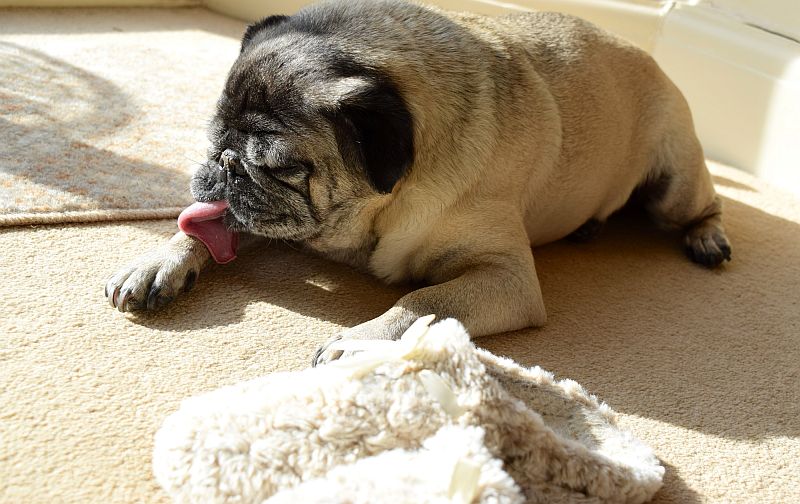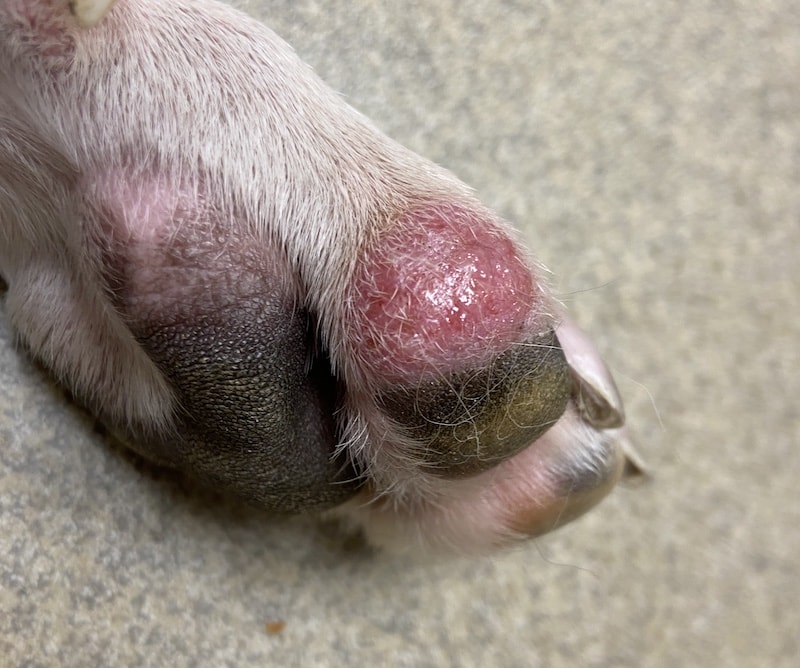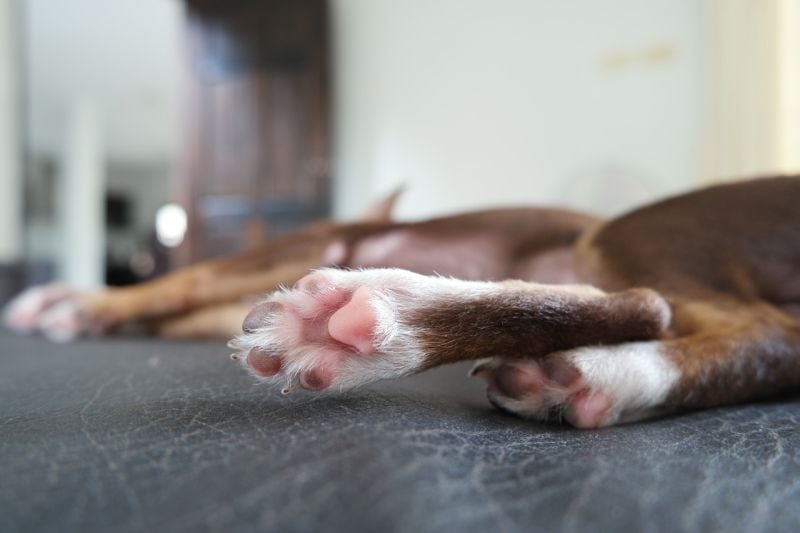Give your pet something to do by purchasing new toys and enrichment games and activities. Address any behavioral issues, such as noise anxiety, by reducing the triggers of stress and making use of pheromone sprays and diffusers, as well as calming treats.
Dogs chew and lick a variety of objects, including themselves. Every dog lover and owner is aware of this behavior because it is normal. Dogs may chew on their paws and nails for a variety of reasons, such as healthy grooming or coping with pain, inflammation, or discomfort. How can dog owners determine when their canine friends’ paw chewing has gone beyond what is considered normal and when it may be a problem?
This article will explain why dogs bite their nails and paws, when it becomes a problem, and what pet owners can do to address it.
Why Do Dogs Lick or Chew on Their Paws?

It can be upsetting to observe your dog constantly chewing on or licking his paws, especially if the behavior just appeared one day.
Finding the cause of your dog’s paw chewing is essential in order to properly assist your furry friend. This is the only way to effectively relieve your pet.
The following are some of the most frequent causes for your dog to recently be licking or chewing his paws:
Here is a picture of my dog Remy’s paw when he was identified as having a bacterial infection by Megan (founder of K9 of Mine). Looks pretty scary, doesn’t it?.
I took Remy to the vet when I saw this enormous red lump that almost resembled an extra paw toe, and the doctor immediately started him on antibiotics. After two weeks, it went away, and he returned to his normal self!

Visit your veterinarian even though you might be able to identify some of the issues mentioned above on your own.
Dogs may experience multiple, concurrent issues that result in itchy paws, and you’ll need your veterinarian’s assistance to treat many paw issues, such as bacterial infections.
What Should You Do If Your Dog Is Chewing His Paws?

When your dog starts chewing on his paws fairly frequently, it’s time to perform a complete physical examination. Any of the following conditions on your dog’s paw pads or in the space between its toes should be noted:
In addition to these visual indicators, you should also check to see if your dog’s paws have a particular smell. Additionally, as was already mentioned, if your dog has trouble putting weight on the affected paw or paws
With the aid of this knowledge, you should be able to collaborate with your veterinarian to identify the underlying cause of the problem and begin the recovery process.
It’s a good idea to consider these alternative causes if your dog’s paws don’t exhibit any of the symptoms mentioned above. You should definitely let your veterinarian know if you notice any significant changes because even though these indications are less frequent, they can still help determine why your pet is chewing on his paws more frequently.
Why Do Dogs Chew Their Paws and Nails?

There are many reasons dogs bite and chew their nails. Abnormal reasons for paw licking and chewing include:
Paw and nail injuries are relatively common. Because they don’t have protective shoes like we do, our dogs are more likely to hurt themselves while out and about. Your dog may have cut or irritated their paw while walking on gravel or stepping on something sharp or hot.
Acorns, rocks, and other tiny objects can occasionally be stepped on by dogs and become stuck in between their toes. While engaging in rough play or even taking leisurely strolls, their nails can occasionally become torn, ingrown, or even broken.
Your dog will typically be focused on one foot in particular and have started licking or chewing their paws suddenly if they have an injury. Depending on their tolerance for pain and the location of the wound, dogs with paw injuries may or may not limp. Usually a new behavior for them, the sudden, persistent paw chewing will last a lot longer than usual grooming sessions.
Check your dog’s paws thoroughly, paying attention to the top, bottom, and space in between the toes. Simple at-home first aid should likely heal minor scrapes or irritations, but a veterinarian should look over cuts, wounds, or nail injuries. Most paw injuries are not serious, and your dog will heal perfectly with the right wound care, antibiotics, and painkillers.
Some dogs are fiercely protective of their feet, so they might not let you look at their paws. In these situations, it’s best to visit the vet as soon as possible so that a qualified individual can assist in checking for any potentially uncomfortable or serious issues.

Dogs with allergies usually have red, itchy skin and paws. Dogs frequently and repeatedly bite, chew, and lick at their feet due to allergies.
In addition to other body parts, dogs with food and environmental allergies frequently develop red, swollen feet and may begin to lose fur in these areas. Contrary to popular belief, dogs with environmental allergies are much more likely than those with food allergies. Only ten percent of allergic dogs actually have a food sensitivity.
Allergy-prone dogs will bite, chew, and lick at their paws and nails to alleviate the discomfort caused by the inflammation in their paws. These dogs typically chew on all four paws rather than just one. A dog may initially only be slightly itchy before gradually becoming more uncomfortable due to allergies.
In most allergic dogs, over-the-counter antihistamines are regrettably not very effective. Your vet can assist you in identifying, treating, and managing your dog’s allergies.
When our dogs have parasitic insects like fleas or mange, they may bite and chew frantically and continuously. Bites from these parasites leave the skin red and inflamed. Dogs with flea or mite infestations frequently bite their entire body, including their feet, and are typically red and itchy elsewhere. Ticks can also cause an itching sensation. Your dog may chew on a tick that has attached to their paw or between their toes to relieve the itching and get rid of the pest.
Just because you can’t see any parasites doesn’t mean there aren’t any because these pests can be difficult to find. Your pet may tear its feet apart due to parasites, which your veterinarian can identify using specialized methods and tests like skin scraping.

Our pets frequently lick themselves to relieve pain. Dogs who are in pain will frequently lick the area near or on their paw. This can happen with any painful condition affecting the leg or paw, but it is frequently seen in dogs with arthritis.
When licking their feet in pain, dogs frequently concentrate on just one paw instead of all four. Unless they lick the area raw, there won’t typically be any visible redness or swelling on the outside of the paws in cases of joint pain or arthritis. To confirm this reason for your dog’s persistent paw licking, your veterinarian can take radiographs (or x-rays) of your dog’s lower legs and paws.
When our dogs’ paws are painful or damaged, they may constantly lick or chew on them. On the paw pads, certain autoimmune diseases like pemphigus can produce painful lesions. Dogs are likely to bite all four paws in these situations. Other problems, such as paw pad corns, which are typically only present in one paw and are common in Greyhounds, cause our dogs to repeatedly bite or chew the affected area.
Treatment for these conditions will depend on the underlying cause. A biopsy may be required if your veterinarian is concerned about an autoimmune disorder. Corns often need to be surgically removed. For dry or cracked paws, over-the-counter paw balm is typically an effective treatment.

Another potential reason why our dogs consistently nibble on their feet is bacterial and yeast infections of the paw pads, nail beds, and/or skin on those feet. These infections may develop as a result of paw chewing due to allergies or an injury, for example.
Infections can affect just one paw or all four paws. The affected paws will usually be red, hairless and swollen. Pus may occasionally be visible from the nailbed, and infected nails frequently turn dark brown near the base of the nail.
In cases of infection, a combination of antimicrobial and anti-inflammatory medications is typically required. In addition, your veterinarian will frequently need to determine what caused the infection to develop in the first place and determine whether the infection was the reason for the licking or vice versa.
Overly tense animals lick or bite their paws and nails repeatedly to calm themselves It can provide them with a focus and serve as a means of diversion from their anxious thoughts. Anxious dogs usually lick their front paws. Usually, there are no visible signs of redness or irritation on the paws.
Dogs develop anxiety for many reasons. You can determine the most effective method to reduce your pet’s stress by consulting with your veterinarian, a trainer, and possibly even a canine behaviorist.
Last but not least, boredom may be the cause if you and your veterinarian have ruled out other, more troublesome causes of unceasing paw licking. Dogs that are bored will lick, bite, and chew their paws and nails to keep themselves busy. Increase your dog’s playtime to help them expend some of their energy, and resume training to help them meet their mental needs. Providing them with food puzzles, safe chew toys, or motorized toys can help them focus on something besides their feet.
FAQ
Should I stop my dog from biting his paws?
Dogs may regularly chew on their paws as part of their grooming routine. But an excessive need to chew could indicate a more serious underlying issue. A veterinarian should be consulted about persistent chewing, especially if other symptoms are present.
What causes dogs to bite their paws?
Dogs occasionally lick their feet or joints out of boredom or stiffness, just as we might rub a sore patch. Your dog may become habituated to licking and biting their front paws out of frustration due to boredom and stress.